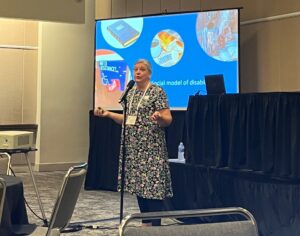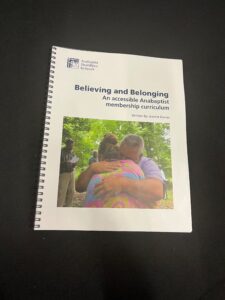
Jeanne Davies presents during accessibility seminar.
On July 4, 2023 during the Mennonite Church USA denominational convention, MennoCon23, Jeanne Davies, executive director of Anabaptist Disabilities Network (ADN) presented an accessibility seminar titled, “Believing and Belonging”. The seminar focused on ADN’s new membership curriculum, “Believing and Belonging.” The content of the new curriculum is written for youth and adults but is meant to be accessible to all, including people with intellectual disabilities. It includes illustrations and follows a “Read, Pray, Do” format. The curriculum is available for purchase online at Brethren Press and also at the ADN exhibit in the convention’s exhibit hall.
Heidi Regier Kreider, conference minister for Western District Conference of Mennonite Church USA (MC USA), who attended the seminar, said, “The curriculum that was presented offers a practical and accessible resource for the church to invitation and discipling within the church community.”

Believing and Belonging curriculum
During the seminar, different aspects of the curriculum and understanding what defines intellectual disability were discussed. The audience was asked to reflect on what it means that humans are “made in the image of God,” as well as “What kind of things are disabling?” and “What does it mean to belong?” Audience members then interacted with their ideas about these posed questions.” Regier Kreider said, “I was struck by the emphasis that belonging to the body of Christ depends more on God’s capacity than our own.”
The traditional definition of “made in the image of God” is “the capacity for reason, the capacity to create, and the capacity to love.” What happens to individuals with intellectual disability when we define our humanity by our capacities? Davies answers this question by stating, “As a reflection of the divine, we are holy. We have intrinsic value. God invites us all into relationship with God.”
When addressing the question, “What kind of things are disabling?” there are different models of disability including physical, social and relational. Davies said, “This [addressing “relational disability] is where the church can shine, should shine!” Inclusivity in church programming is one of the ways that this can be facilitated.
One of the most pressing issues that the curriculum, “Believing and Belonging,” helps churches to address is the question of baptism within the Anabaptist tradition. Because of the challenges that can be associated with intellectual disability, it is important to focus on the value of “no coercion” baptism and that it is a choice. In one of the examples that Davies gave, a church threw a celebration of belonging for an individual who was not able to give clear decision but was excited to be part of the church community, instead of choosing baptism for her. Even though she was not baptized, it was clear that she belonged to her church community and to God.
The Quiet/Sensory Room
Anabaptist Disabilities Network (ADN) is hosting a Quiet/Sensory Room in room 1501C for those who would like a quiet space to reflect, pray or rest throughout the week of convention. Jeanne Davies, executive director of Anabaptist Disabilities Network said, “Convention is exciting and energetic but can also be overstimulating and tiring. We created the sensory room for people who need to take a break, relax and be refreshed.” The room includes fidgets, noise cancelling headphones, weighted blankets and low lighting.
Mennonite Church USA is the largest Mennonite denomination in the United States with 16 conferences, approximately 517 congregations and almost 52,000 members. An Anabaptist Christian denomination, MC USA is part of Mennonite World Conference, a global faith family that includes churches in 59 countries. It has offices in Elkhart, Indiana, and Newton, Kansas. mennoniteUSA.org
By Christle Hain for MC USA

